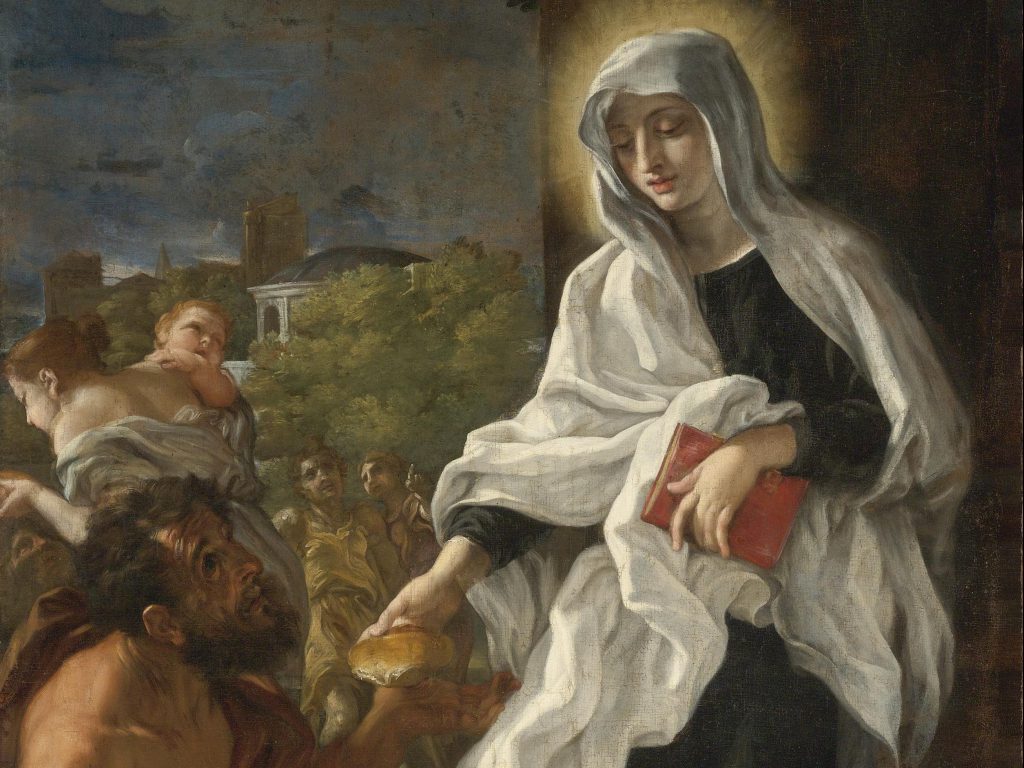Francesca had always shown great piety at a young age and she wanted to pursue the road to becoming a nun. But following her family’s wishes, to marry into a religious family with wealth, she married Lorenzo Ponziano and the two would have a family including three children. In 1400, a year after Francesca had given birth to her first son, Lorenzo’s mother died. With the head of the house being vacant, Lorenzo’s family, mainly Lorenzo’s father Andreazzo, decided Francesca would take over the management and domestic affairs of the household. Francesca protested the decision, claiming her inexperience and youth didn’t make her the best for the role. She argued that Vannozza, the wife of the eldest Ponziano son, should be granted the position. Despite her cries, the Ponziano men insisted she should be in charge because of her wisdom and virtue. Unable to deny her family’s eagerness and pleas, especially Andreazzo’s, Francesca became the head of the richest house in Rome.1

Francesca led the people in her house with firm kindness no matter the relation she had with them. Servants were treated with love and patience, and given encouragement to follow the word of God. She never spoke badly to a servant and she would give them enough leisure time to attend not just Sunday mass but masses on holidays and special occasions. She also expressed the desire for her servants to pass down her compassion to whomever they crossed paths with. About a year after Francesca took on her new role, Rome started to experience famine and disease. Francesca prohibited her servants from turning down any poor person who came to the wealthy Ponziano family for help. She told her servants they could not send away anyone without their request being fulfilled, but unsatisfied with that, she eventually stepped in herself. She would greet each beggar personally and invite them in while she gathered supplies of corn, wine, oil, and clothing for them. Like with her servants, she would also encourage them to follow God, pray regularly, and fulfill their other religious duties. Francesca’s giving did not stop there, as she and Vannozza would visit hospitals and other far corners of the city to give out more supplies.2
Her charity, however, did not go over well with everyone, as Andreazzo grew alarmed that Francesca’s constant giving could possibly backfire on their own family. Fearful of a famine happening in his own home, he restricted the supplies available to Francesca and Vannozza. First, he started by taking away their keys to the granary, but to avoid caving in to their pleas, he started to sell the corn that wasn’t needed to feed the family in their daily life. He followed the same strategy with the wine cellar and sold all the extra wine except for one cask for the family. As each day passed, though more people in Rome started to suffer, Francesca couldn’t stand by and do nothing. Francesca and Vannozza pushed down any repulsion and shame they might have felt as they took to the streets to beg for the poor. They visited churches, palaces, and followed the rich around in public with tears in their eyes to receive whatever donations they could get. Although happy with what they could collect, they weren’t so happy with the harsh judgment, sneers, and insults they endured while crying for mercy for others. While doing this, Rome’s famine reached its peak and the streets were lined with practically naked, starving, and sick people calling out for death to put an end to their suffering. Francesca was devastated by the groans of pain and the sight of the countless ghastly faces. She would be haunted by this experience day and night. She felt that she would have done anything to end their suffering. She would have even gladly shed her own blood and fed them with her own life.3

One day, Francesca was hit with a thought to look in the corn-loft hay piles, as that was what mostly occupied it without the abundance of now sold corn, for any extra corn she could find that she could give to the poor. She had Vannozza and their closest pious servant, Clara, help with the search. The three spent hours on their knees digging through the hay, and triumphantly at the end of it, they collected a measure of corn. Just as the group was exiting the loft, Lorenzo walked into the granary and froze in shock because of what he saw. There in the place of the giant pile of hay that the women had just gone through was miraculously 40 measures of corn. The corn was bright yellow and looked so pristine that it looked like it could have been grown in heaven by angels themselves. Despite this one miracle, the poor needed more than just corn; they also came to the doorstep begging for wine. Francesca was defenseless to deny the numberless elderly men, young children, mothers with infants, and priests. So she took from the only cask of wine they had until every drop was given away. Once Andreazzo found out about the empty cask, he raged at Francesca as he never had done before, as this was the first time he was angry with her. “Charity indeed! Charity begins at home; a pretty sort of virtue this, which, under the pretext of assisting strangers, introduces penury and privation into the midst of a person’s own family,” he exclaimed.4 The other men of the household took Andreazzo’s side and also expressed anger at Francesca. But Francesca did not react harshly to the abuse, but instead, she quietly prayed. She then replied to them in a gentle voice, “Do not be angry; let us go to the cellar; may be, through God’s mercy, that the cask may be full by this time.”5 Begrudgingly, the men followed her to the cellar to watch her stop in front of a barrel and take out the cork. Instantly, exquisite wine started pouring out of it, a wine that Andreazzo confessed to being the best he had ever tasted in his life. Andreazzo turned to Francesca with tears spilling out of his eyes and cried, “Oh, my dear child, dispose henceforward of every thing I possess, and multiply without end those alms that have gained you such favour in God’s sight.”6

The story of this miracle was spread around, and humble Francesca did not protest it. She wanted this experience to show the Divine power in almsgiving and motivate the wealthy to give more to the poor, especially to the poor who followed God’s word. At the sight of so many miraculous acts, Lorenzo grew a new respect for Francesca’s dedication to her faith. He then encouraged her to follow any Divine act she wanted and dismissed her of her role in the household. Free from this responsibility, she was given complete freedom to do whatever she pleased at any time she desired. It wasn’t too long until Francesca was off doing what she always wanted to do. She sold all of her expensive dresses, jewels, and ornaments and gave the collected money to multiple poor families. She sacrificed a lot to give to others, not just material things as she would only wear her only old green dress after selling her others, but her body as well. She fasted immensely so she was able to give her portions of food away and she spent so much time trying to help the poor that she looked ill and fragile. It was believed that her health was so concerning that there was no other way she could have survived doing the amount of work she did without miraculous support. Francesca would later on in her life open up a monastery for nuns, who would later be known as the Oblates of St. Frances of Rome. Francesca passed away in 1440, at the age of 56, and was immediately canonized by Pope Paul V.7
- New Catholic Encyclopedia, 2003, s.v. “Frances of Rome, St.,” by M. Monaco. ↵
- Lady Georgiana Fullerton and J.M. Capes, The Life of St.Frances of Rome: Of Blessed Lucy of Narni, of Dominica of Paradiso, and of Anne de Montmorency (New York: P. J. Kenedy, 1901), 33. ↵
- Lady Georgiana Fullerton and J.M. Capes, The Life of St.Frances of Rome: Of Blessed Lucy of Narni, of Dominica of Paradiso, and of Anne de Montmorency (New York: P. J. Kenedy, 1901), 34. ↵
- Lady Georgiana Fullerton and J.M. Capes, The Life of St.Frances of Rome: Of Blessed Lucy of Narni, of Dominica of Paradiso, and of Anne de Montmorency (New York: P. J. Kenedy, 1901), 35. ↵
- Lady Georgiana Fullerton and J.M. Capes, The Life of St.Frances of Rome: Of Blessed Lucy of Narni, of Dominica of Paradiso, and of Anne de Montmorency (New York: P. J. Kenedy, 1901), 36. ↵
- Lady Georgiana Fullerton and J.M. Capes, The Life of St.Frances of Rome: Of Blessed Lucy of Narni, of Dominica of Paradiso, and of Anne de Montmorency (New York: P. J. Kenedy, 1901), 37. ↵
- Women in World History: A Biographical Encyclopedia, 2002, s.v. “Frances of Rome (1384-1440),” by Anne Commire. ↵



25 comments
Serenity Kamenski
I never really heard the story of the Saint Frances of Rome before today, but while reading it, it felt very inspiring and gives hope that there can be good within the world. What amazes most about her story is how she came from a wealthy family, where she didn’t necessarily have to beg for food or even help out the less fortunate, but still dedicated her time and resources to ensuring others didn’t suffer as much as they had before. Her heart and giving nature show that despite certain circumstances or privilege, she always found a way to give back. Great article by the way.
Lucia Herrera
This is a great article about the St. Frances of Rome. I like how the article gives much detail about the alms giving and a saint. I think this is such a nice story and something people can learn from.
Andres Ruiz
I like this article because it focuses on alms giving and a saint. This article is particularly interesting because it talks about a very catholic story about a woman who gave up a lot of wealth to help people. St. Frances of Rome was a good person who, I think, reflects a good understanding of Catholic Culture, and probably further solidified the ties of Rome and Catholicism.
Carlos Hinojosa
This was a beutiful story about the Saint Frances of Rome. You can tell that she was definitely a good person no matter what even if she was rich. I actually never heard this story before so that was a nice feel good story about someone trying there hardest to help everyone. The article was well made and expressed the determination Frances had in trying to help everyone.
Jourdan Carrera
The act of alms giving has always been one which has interested me. I find this article particularly interesting as it talks about a very wealthy woman who came from one of the wealthiest families in Rome, and how she, with all her vast wealth, was able to practice the act of alms giving. I also find this story particularly in interesting as it somewhat mimics the miracle of Christ with the loafs and the fishes. As, even though the family wine reserves were empty, there still streamed a stream of wine, even when it was thought that they had completely run out. And because of this not only could the family have enough to drink, but so could the poor that St. Frances wished to help.
Faith Chapman
I find it amazing that she never showed any anger or complained when she was pressured to be the head of the Ponziano family household, when Andreazzao intentionally limited the amount of supplies she had access to to stop her from giving excessively to the poor, nor when the family’s men lashed out at her for continuing her actions. It’s also incredible that she would fast just so she can eat less and therefore have more food to give. I had heard of almsgiving before, but this is a great article to introduce to someone who doesn’t really understand what it means.
Carlos Cortes
I had never heard the story of St. Frances of Rome and after reading such an amazing article I am fascinated with her story. She is a prime example of how to live like Jesus did, she was the head of the wealthiest family of Rome and was still able to keep her humility. Her story shows the importance of perseverance, although al first all the men were against her actions. Through a few miracles she was able to convince them that this was truly her calling and what God wanted her.
Eric Hernandez
I like this article because I’ve never really understood the meaning or story behind Alms giving. Reading through the article, it mad me realize the importance of helpful and always willing to give. It also showed me that if we help those in need, we can help contribute to the causes or issues we go through and solve them as a whole with the power of God.
Madeline Chandler
Such an interesting informative article! I had never read anything about St. Frances and it was truly captivating and inspirational. Her kindness was unmatched when she cared for beggars, sickly, and everyone. She was the Mother Teresa before Mother Teresa existed. Her devotional to God for the betterment is something everyone needs follow. Great job, and I loved reading your article.
Micheal Baladez
Being raised within a christian household with a catholic father, I have never learned the story of St. Frances of Rome. Overall, I found this reading to be a very interesting one; learning how she never second guessed what she knew was her calling, and how she always did something to help those who were less fortunate was fairly inspiring. Also, the fact that she never forgot her faith, never expected anything back, or never expected to get recognized for it, she just did it out of the greatness of her heart was just proof that she was one of the truest definitions of a saint. Yet, all she did was what she knew was right as a person and as someone who believed in God.